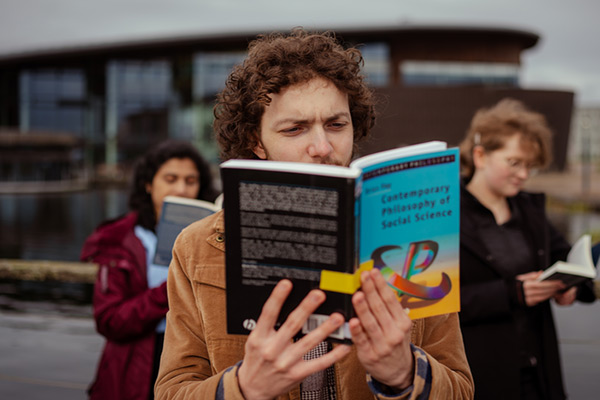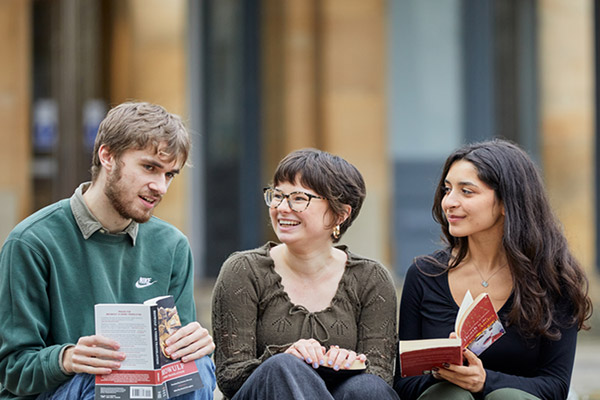View semester dates

BA (Hons) English/Philosophy
On this degree, every day is a new intellectual adventure.
Year of entry: 2026/27
View semester dates
6th in the UK for English
8th in the UK for philosophy
32nd in the world for English language and literature
Why study English and philosophy at York?
Explore an extensive range of modules across two departments. You’ll cover all periods of literature and philosophy from the classical period to the present day on options that span different cultures, allowing you to tailor your degree to your own interests. In English your options will also include film, creative writing, and literature from around the globe, while in philosophy you can choose from interdisciplinary electives with project-based learning experiences as you work with experts in the field.
Take an interdisciplinary view. Combining English and philosophy allows you to explore enduring questions that have shaped past societies and cultures. Encompassing almost every aspect of human thought and culture, this course will expose you to an array of ideas and ways of thinking about the world.
Flexibility to add a Placement Year or Study Abroad. You’d then graduate with a BA in English and Philosophy (with Placement Year) or BA in English and Philosophy (with Study Abroad). Whether you’re interested in gaining experience in a particular industry or looking to expand your horizons by studying in another country, we’ll support you in exploring the options available to you.
Gain valuable skills that will set you up for a range of careers. You’ll develop your own research projects that address different briefs, learning to think critically, analyse texts, and develop persuasive arguments. Our Careers and Employability Coordinator will help you to think about these skills in relation to employability and to navigate the resources and opportunities available, including internships, a placement year, and more. We regularly advertise careers events by industry experts.

The flexible, diverse, and interdisciplinary modules enticed me. Unlike other Russell Group universities, York offers modules on various contemporary literary forms. For instance, fiction, film and comics, or other practical modules on publishing, archiving, creative writing and translating.
Course content
Our English/Philosophy degree has a distinctly international perspective. You’ll cover an exciting range of literary and philosophical topics, from the classical era to the modern world.
Year 1
In the first year of your degree, we’ll introduce you to the undergraduate study of English and Philosophy through six core modules. These will give you the skills you need to start undertaking literary and philosophical research, and advice on how to combine the two disciplines.
English
Core modules
We’ll introduce you to an exciting range of texts and critical approaches in your first year to lay the foundation for your degree.
Philosophy
Core modules
In Philosophy, your core modules will give you foundational knowledge and skills in both practical philosophy and theoretical philosophy and a taste of the variety of philosophical approaches pertaining to different traditions.
Academic integrity module
In addition to the above you will also need to complete our online Academic Integrity module.
Year 2
In the second year of your degree, you’ll choose six modules from a range of options in English and philosophy.
Option modules
English
Intermediate Option Modules
Our Intermediate Option Modules allow you to deepen your understanding of the relationship between literary works and the cultural, historical, and political contexts in which they were produced.
- The Shock of the New: Medieval Literature
- The Renaissance
- Inventing Britain, 1700-1830
- Making the Modern: Global Literature in the Victorian Age
- Age of Extremes: Twentieth-Century British and Irish Literature
- American Literature: From the First World War to the End of Empire
- Creative Writing: Contemporary Practice
World Literature Modules
Our World Literature Modules invite you to engage with questions of language, translation, and cultural difference in ways that equip you with important skills in linguistic analysis and description. Some examples include:
- African Imaginations and Afrophone Literatures
- Against the Grain: European New Cinema
- Eros: The Literature and Philosophy of Love
- Introduction to Greek and Roman Literature
- Modern French and Francophone Literature
- Modern Latin American Literature
- Medieval Arabic and Persian Global Literature
- Old Norse Literature
- The World of Beowulf
Philosophy
You will choose from the same wide range of philosophy options as our Philosophy single subject students in the areas of theoretical philosophy, practical philosophy, and history of philosophy, including:
Theoretical Philosophy
- Knowledge and the Social Sciences
- Logic and Paradox
- Metaphysics
- Philosophy of Language
- Philosophy of Mind
- Philosophy of Science
- Politics and Freedom: Anarchism and Conservatism
Practical Philosophy
History of Philosophy
- Being and Reason: Spinoza's Metaphysics
- Love, Law and Solidarity: Recognition from Rousseau to Honneth
- The Limits of Reason: Kant's Theoretical and Practical Philosophy
Some option module combinations may not be possible. The options available to you will be confirmed after you begin your course.
Elective modules
You may be able to replace one option module with an elective module, studying a complementary subject, a language or an interdisciplinary topic.
Year 3
In the third year of the degree, you’ll choose from options in English and Philosophy, including the year-long English Dissertation or the Philosophy Short Dissertation.
Option modules
You will choose between four and six option modules in English and philosophy (depending on whether you choose to take the year-long English dissertation). Examples can be found below.
English
In English, you will choose from the department’s Advanced Option Modules. These reflect the wide-ranging and cutting-edge research expertise of the Department, and our options cover literature from the classical period to the twenty-first century, as well as film and creative writing. Students can typically choose from over 30 options. Some examples include:
- 21st Century American Fiction
- Black Writers of the Global Nineteenth Century
- Borders Bodies Bridges: Migration and Racialisation in Modern Literature and Culture
- Crafting the Past: Reimagining the Eighteenth Century
- Elemental: Contemporary Indigenous Literatures in English
- From Tennyson to Tolkien: The Middle Ages and Modern Literature, 1840-1940
- Green Romanticism: Nature, Ecology, Calamity
- Modernism's Queer Spaces
- Pulp Fictions of Medieval England: Romance and Popular Literature
- Spices and Spies: Renaissance Global Travel
- The Stuff of Poetry
- The Villains of Romantic Gothic
- The Writer's Notebook: A Prose Fiction Workshop
Philosophy
- Buddhism as Philosophy
- Causation and Laws
- Cognitive Anomalies, Decision-Making, and Democracy
- Consciousness
- Contemporary Issues in Bioethics
- Experimental Philosophy: The Psychology of Philosophy
- German Idealism: Moral, Legal and Political Philosophy
- Foundations of Maths
- Happiness, Utility and Well-Being
- Mind and Morality
- Nine Artworks, Nine Philosophical Problems
- Philosophy of Christianity
- Philosophy of Law (York Law School)
- Philosophy of Psychology
- Theories of Social Justice: Rawls and Beyond
- Topics in Feminist Philosophy
- World and Mind
Some option module combinations may not be possible. The options available to you will be confirmed after you begin your course.
Elective modules
You may be able to replace one option module with an elective module, studying a complementary subject, a language or an interdisciplinary topic.
Our modules may change to reflect the latest academic thinking and expertise of our staff, and in line with Department/School academic planning.
Learning outcomes
Every course at York has been designed to provide clear and ambitious learning outcomes. These learning outcomes give you an understanding of what you will be able to do at the end of the course. We develop each course by designing modules that grow your abilities towards the learning outcomes and help you to explain what you can offer to employers. Find out more about our approach to teaching and learning.
Learning outcomes for this course
- Read philosophical and literary texts with close critical attention, clearly explaining and interpreting them and their relations to the issues, traditions and periods in which they participate, and synthesizing information from secondary sources.
- Develop and articulate arguments for alternative solutions to key philosophical problems in an open-minded and imaginative way, by presenting the best case that can be made for each proposal and advancing a reasoned judgement about the best solution.
- Analyse the power of language, rhetoric and narrative and the influence they have upon cultural, political, and ethical issues, using this awareness better to understand the world and influence others.
- Exercise and continually develop their independent thought and critical judgement by interrogating their own underlying assumptions and identifying strengths and weaknesses, refining their critical engagement with arguments and texts in the light of self-reflection, peer review, and advice and feedback from others.
- Engage analytically with contemporary social, political and ethical problems and issues of value, and display a critical awareness of cultural diversity informed by knowledge of the literatures of different varieties of English or other European languages, so developing the ability to operate in complex global and multicultural contexts.
- Engage productively in critical discussion and debate, and therefore work effectively in collaboration with others, by cultivating advanced oral communication skills.
- Influence people by writing clearly, accurately and persuasively, articulating ideas and presenting systematic, logical arguments to support measured judgements, and doing so in lucid and accessible terms, to a deadline and to a professional standard.
- Move confidently between the methods and practices of the disciplines of English and Philosophy, rigorously applying the skills appropriate to a given context whilst maintaining a creative, intellectually independent alertness to the relevance of alternative ways of thinking and the insight they can afford.
Fees and funding
The fees and funding information here is for students starting in the 2026/27 academic year.
If you take a year abroad or year in industry you'll pay a reduced rate of fees for that year.
Annual tuition fees
| UK (home) | International and EU |
|---|---|
| £9,535 (TBC) | £26,900 |
The UK government has announced its intention to increase tuition fees from £9,535 to £9,790 for the 2026/27 academic year. We expect this to apply to new UK (home) undergraduate students starting their studies in September 2026.
UK (home) or international fees?
The level of fee that you will be asked to pay depends on whether you're classed as a UK (home) or international student. Check your fee status.
Fees for subsequent years
- UK (home) fees may increase within the government fee cap in subsequent academic years. We will notify you of any increase as soon as we can.
- International fees are subject to increase in subsequent years in line with the prevailing Consumer Price Index (CPI) inflation rate (up to a maximum of 10%).
More information
For more information about tuition fees, any reduced fees for study abroad and work placement years, scholarships, tuition fee loans, maintenance loans and living costs see undergraduate fees and funding.
Additional costs
You'll need copies of the texts set for each module. Where possible, the Department works to arrange digital copies via the University Library. Where this is not practical, you'll be instructed in advance of the start of each term about the texts and editions you'll need to purchase (whether new or second-hand).
Funding
We'll confirm more funding opportunities for students joining us in 2026/27 throughout the year.
York, Oxford, Cambridge, Imperial
Just four UK universities are rated Gold for teaching and top ten for research* in the latest national assessment exercises.
* Awarded joint 10th in the Times Higher Education ranking of the Research Excellence Framework 2021.
Teaching and assessment
You’ll study and learn with academics who are active researchers, experts in their field and have a passion for their subjects. Our approach to teaching will provide you with the knowledge, opportunities, and support you need to grow and succeed in a global workplace. Find out more about our approach to teaching and learning.
Teaching format
In English, you’ll learn through a programme of seminars, lectures, workshops, and one-to-one consultations. We emphasise small-group teaching, which means you’ll mainly be taught in seminars.
Teaching in philosophy takes much the same form. The department prides itself on having smaller seminar groups than some other universities, and staff strongly encourage one-to-one conversations in open office hours.
York’s English and Philosophy degree is renowned for its flexible and innovative approach.
- Our dedicated research informs all our teaching activities.
- Our friendly, approachable, and accessible staff are world-leading experts in their fields. They are each available to meet individually with you during weekly open office hours – two in English and at least one in philosophy.
- We organise many guest lectures and readings by well-known writers and philosophers.
Timetabled activities
In your first year, you can expect:
| Lectures | 4-5 hours per week |
|---|---|
| Film Screening | 2-3 hours per semester |
| Seminars and workshops | 5-6 hours per week |
These figures are representative of a typical week. Your contact hours will vary throughout the year due to your module choices, non-compulsory classes, exam periods and changes to scheduled activities.
Outside your timetabled hours, you'll study independently. This may include preparation for classes, follow-up work, wider reading, practice completion of assessment tasks, or revision.
In the UK, full-time students are expected to spend 1,200 hours a year learning. That's about 40 hours of classes and independent study each week during semesters. Everyone learns at a different rate, so the number of hours you spend on independent study will be different to other students on your course.
Facilities
Thin Ice Press is the Department of English and Related Literature’s in-house printing studio, whose iron presses chart the evolution of print from 1838-1926. They offer opportunities to experience the relationship between writing and printing practices through publication, practice-led research, teaching, and public workshops.
Teaching location
You will be based in the Department of English and Related Literature and the Department of Philosophy on Campus West.
Most teaching will be nearby in Derwent College, the Spring Lane Teaching Building and other Campus West locations.
About our campus
Our beautiful green campus offers a student-friendly setting in which to live and study, within easy reach of the action in the city centre. It's easy to get around - everything is within walking or pedalling distance, or you can use the fast and frequent bus service. Take a campus tour.
Assessment and feedback
The Department of English and Related Literature employs a variety of assessment methods, including group projects and open exams, but with a strong emphasis on essay writing. Your main mode of assessment will be essays, which will range from short exploratory exercises to more detailed discussions on a topic of your choice. We offer high levels of feedback and ample opportunities for you to meet with staff to discuss your written work.
Your work in Philosophy is assessed by a more or less equal mix of essays and exams – the exact blend of assessment depends on the modules you choose. In the first year, some work is assessed by online tests and poster presentation.

Philosophy is a social subject – views and ideas only develop and grow when discussed with others. Because of this, the people and atmosphere of the Department is so important and, in my experience, has been amazing at York.
Careers and skills
Studying English and Philosophy at York will provide you with numerous career possibilities. You’ll learn presentation, language, and critical thinking skills during your combined degree, and gain expertise in complex analysis and research. These skills suit a range of careers, from law and teaching to national and local government and the creative industries.
Our English alumni
What Philosophy students say
Career opportunities
- Advertising, marketing, social media, and public relations
- Arts administration
- Civil and diplomatic services
- Film, radio, television, and theatre
- Journalism and broadcasting
- Law
- Librarianship
- Member of Parliament
- Publishing
- Teaching
Transferable skills
- Ability to analyse and compare complex texts
- Communication and teamwork skills
- Capacity to write clearly and fluently for a variety of audiences
- Critical and analytical thinking
- Data interpretation
- Experience of researching and debating challenging topics
- Independent study skills
- Logic and rhetoric
- Proficiency in presenting findings cogently and persuasively using information technology
The English part of my degree helped me develop the skill of being able to absorb and analyse large amounts of information at short notice which is a daily demand in the world of law.
Solicitor, Dickinson Dees LLP
Entry requirements
| Qualification | Typical offer |
|---|---|
| A levels | AAB including an A in English Literature (English Language and Literature is also acceptable) |
| Access to Higher Education Diploma | 36 credits at Distinction, including at least 9 credits in Literature-related units, and 9 credits at Merit or higher |
| BTEC National Extended Diploma | DDD with an additional A Level or equivalent qualification in English Literature at grade A |
| European Baccalaureate | 80% overall, with 85% in English Literature. |
| International Baccalaureate | 35 points including 6 in English Literature at Higher Level (Higher Level English Language and Literature is also acceptable) |
| T levels | We are currently not accepting T Levels for this course unless an additional A Level (or equivalent qualification) in English Literature has been taken. |
| Scottish Highers / Advanced Highers | Advanced Highers - B in English Literature Scottish Highers - BBBB We may also be able to consider three Advanced Highers or a combination of Highers and Advanced Highers, where an applicant does not meet the grade requirement through Highers alone. Please contact us to discuss your qualifications. |
| Other international qualifications | Equivalent qualifications from your country |
Alternative offers
Meeting the following additional criteria may qualify you for an alternative offer.
| Criteria | Adjustment |
|---|---|
| Widening participation | BBC including B in English Literature (English Language and Literature is also acceptable) This is conditional upon successful completion of the WP programme including the YorJourney module (Black Access Programme, Next Step York) or successful completion of Realising Opportunities More about widening participation. |
| Contextual offer | ABC including an A in English Literature (English Language and Literature is also acceptable) |
| EPQ | If you achieve A or higher in the EPQ, you may be eligible for an alternative offer up to one A level grade (or equivalent) below our typical offer. |
| MOOCs | If you successfully complete our online course Logic: the language of truth, you may be eligible for an alternative offer up to one A level grade (or equivalent) below our typical offer. Details about how to evidence completion of the MOOC will be sent in your offer letter. Please note: you do not need to pay for the certificate. More about MOOCs. |
English language
If English isn't your first language you may need to provide evidence of your English language ability. We accept the following qualifications:
| Qualification | Minimum requirement |
|---|---|
| IELTS (Academic) | 6.5, with a minimum of 6.0 in each component |
| IB English | A score of 4 in English A or 5 in English B (Higher Level or Standard Level) |
| Cambridge CEFR | 176, with a minimum of 169 in each component |
| Oxford ELLT | 7, with a minimum of 6 in each component |
| Oxford Test of English Advanced | 136, with a minimum of 126 in each component |
| Duolingo | Integrated subscores: 120 overall, with a minimum of 105 in each component |
| GCSE/IGCSE/O level English Language (as a first or second language) | Grade C / Grade 4 |
| LanguageCert SELT | B2 with a minimum score of 33/50 in each component |
| LanguageCert Academic | B2 with a minimum score of 33/50 in each component |
| Kaplan Test of English Language | 478 Main Flight score with 444 in each component |
| Skills for English | B2: Merit overall, with Pass with Merit in each component |
| PTE Academic | 61, with a minimum of 55 in each component |
| TOEFL | 87 overall, with a minimum of 21 in each component (taken before January 2026) 4.5 with 5 in Listening and 4.5 in each other component (taken after January 2026) |
| Trinity ISE III | Merit in all components |
| Other English language qualifications | We also accept other English Language qualifications, including various school-leaving certificates. |
For more information see our undergraduate English language requirements.
If you haven't met our English language requirements
You may be eligible for one of our pre-sessional English language courses. These courses will provide you with the level of English needed to meet the conditions of your offer.
The length of course you need to take depends on your current English language test scores and how much you need to improve to reach our English language requirements.
After you've accepted your offer to study at York, we'll confirm which pre-sessional course you should apply to via You@York.
Next steps
Contact us
Get in touch if you have any questions
English Undergraduate Admissions
Related courses
Discover York








